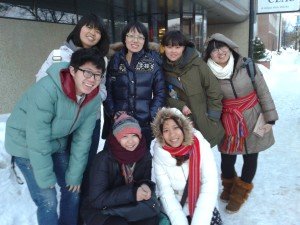As I sat in our neighbour college’s Ash Wednesday service this week, I heard in my mind the words of God’s messenger to the prophet Ezekiel: “Son of man, can these dry bones live?” It is a question I have come to make my own, rolling it over in my mind as I try to understand the changes sweeping through our church.
Campus ministry isn’t much different from parish ministry in that most of us have increasing difficultly getting students out to services and finding new ways to nurture their spiritual growth. But on this day, as I sat among Jesuit friends, the chapel was packed. I looked out across the room, populated with staff and students from both colleges, and saw “dry bones” living. But these students were not the white farm kids I grew up with. No; as I peered out into a sea of faces I saw students from the Philippines, from Nigeria, and from India.
I have often been amazed by the faith of our international students. Even those from other traditions or no faith at all tend to be more open to engaging questions of faith than their Canadian peers. When questioned about my role as chaplain, I’m often nervous about imposing my religiosity on them, but I needn’t be. They are generally intrigued and interested by stories of faith. In fact, I can have some of the best conversations about faith with my Muslim students.
It’s tempting to think that in our post-Christendom world, God is bringing what Philip Jenkins calls “the new Christendom” to us. Christians from places where the Church is flourishing are increasingly filling both our pews and campus ministries. Both my students and I have to wrestle with faith together, as we come from different places and bump up against new experiences. It is true that I often practice my faith differently from my new friends, but as we learn from one another I have no doubt that God has placed them among us for a reason. We ought, at the very least, to pay attention.
But lest my optimism get away from me, stats have shown that young people from countries of faith tend to fall away from that faith within a generation or two of living in Canada. In other words, having a Christian grandmother from Zambia doesn’t make a college student much more likely to engage her faith than having a Christian grandmother from Lethbridge.
And yet, God continues to send us newcomers with fresh and different perspectives on faith, both challenging our own complacency and expanding our vision of the Church. What is God teaching us through these passionate brothers and sisters from across the globe? These students have shown me that while the tides of the Church are changing, shifting tides do not mean death. Quite the opposite, perhaps: shifting tides bring new kinds of life. When I am forced to wrestle with the faith of a friend who comes from a very different context with entirely different assumptions, I have to dig deeper into my own faith to understand what I believe and why. There are some things I need to let go of. There are other things I will always keep.
Primarily, though, I see in my international students dry bones living. When Ezekiel stood looking over the valley of dry bones, he had no idea what God would do to make them live. And since the days of the prophet, God has been using all kinds of unexpected things to breathe new life into God’s Church. I am excited by the challenge and growth I see being birthed among new Canadians and am looking forward to seeing where they take us. I wonder how your community has learned and grown from a spark of faith visiting from far away?

